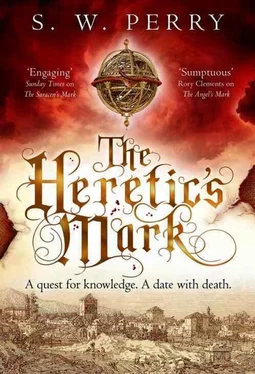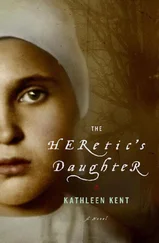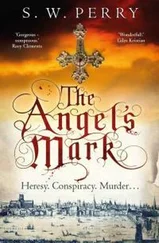‘Of course, you read Italian. I had almost forgotten you were a foreigner to our realm. Padua, was it not?’
‘Yes. That is where I was born. But we could not afford a machine to tell us the hour, Sir Robert. We had to rely on the church bell. We managed, I seem to recall.’
‘It is a brother to one I presented to the queen,’ Cecil says proudly. ‘The mechanism was made by the late Master Urseau, Her Grace’s clockmaker. But I imported the cases from Florence. She prefers things Italian to French. She still thinks Master Urseau came from Turin. She will hear nothing to the contrary.’
‘Do we really have need of such devices?’ Bianca asks. ‘Should we not rely on nature to tell us when to get up or go to bed, when to sow our crops and when to harvest them? I’m content with the church bell and the rising and setting of the sun. It seems more in tune with how things should be.’
‘My wife has better intuition than many,’ Nicholas says. ‘Perhaps that is because her senses are sharper.’
Cecil gets up from his desk. He points to the Molyneux globe in the corner of the study, a model earth made of wood and lacquer set on its axis in an elaborately carved frame. It is the one on which he described the journey Nicholas was to undertake to Morocco the previous year. ‘Senses are all to the good,’ he says. ‘They are given to us by God, so that we may see His world in all its majesty. But if my cousin, young Master Francis Bacon, is right, we are entering a world in which the new learning – measurement, precision, discovery – will give us answers to phenomena that are, at present, mysteries to us. I happen to think he is right. Why, there are now clever artisans who can make a clock so small that a man may carry it in his purse. My father has one. Soon we may be able to measure accurately not just the passing of the hours, but minutes – even the theoretical second.’
Nicholas thinks: you’ve come a long way from the day, almost four years ago, when you thought that because one of my medical books was printed in Italy, the knowledge in it must be heretical.
‘Why would we want to do that?’ Bianca asks. ‘Do our lives not speed by far too quickly as it is?’
Nicholas winces. The Cecils are not accustomed to being questioned by their inferiors, least of all by a female recusant. But Sir Robert has developed a grudging respect for Bianca Merton and gives her nothing more reproachful than an indulgent smile.
‘It is all about measurement, Mistress Merton,’ he explains. ‘As an example, measurement might help us learn if Master Copernicus was right when he claimed the earth is not still, and that instead of being fixed at the centre of the cosmos, it moves about the sun in a great orbit.’ He shrugs. ‘Though why we don’t all fly off as it travels, he failed to tell us.’ Glancing at Nicholas, perhaps for respite, he adds, ‘Given your wild views on some matters of physic, Nicholas, I presume you favour the Polack’s claims.’
‘I believe they merit further consideration, Sir Robert.’
‘Don’t tell the bishops that, or there are bound to be more anonymous accusations made against you.’
Nicholas stiffens. ‘You have news?’
Cecil gives him a look of regret. ‘Not much, though I fear what I have been able to determine is not good.’
‘Please be frank with me, Sir Robert.’
‘There was more than one letter sent. But they are all in the same hand.’
Nicholas closes his eyes. ‘Sent to whom?’
‘Sir John Popham, Chief Justice of the Queen’s Bench.’
Nicholas winces. ‘Oh, Jesu !’
‘And the Attorney General, Sir Edward Coke. There could be others.’
Bianca grips her husband’s arm. She leans into him, telling him without words that he does not face this new danger alone.
‘What can I do?’ he asks.
‘I can keep Essex at bay a little longer,’ Cecil tells him, returning to his desk. ‘But with Popham and Coke demanding further investigation, I fear I may be outfought.’
‘Then I am still in danger of arraignment?’
Cecil looks pained. ‘I will do my utmost for you, Nicholas. I promise it. I do not wish the only physician I trust – not to mention a particularly useful intelligencer – to fall because of malicious tittle-tattle.’ A sigh, followed by an opening of the palms to show that even a privy councillor has limits to what he may achieve. ‘But if they succeed in convincing Her Grace not to heed my defence…’
‘What do you suggest I do, Sir Robert?’ Nicholas asks, unable to keep a trace of desperation from his voice.
‘Until I get to the bottom of this slander, I think it would be wise for you disappear for a while.’
Bianca turns her head away from her husband. She doesn’t want him to see the shadow of fear that has clouded her eyes. Since the day he came to her – a living corpse covered in river mud, a man who had sought to destroy himself because his physic could not save his first wife and the child she had been carrying – Nicholas has left her only twice. On both occasions he brought violence and death clinging to his shadow when he returned.
‘I could go back to Suffolk,’ he says. ‘I’m not much of a farmer, but my father will put on a brave face and tell me he’s grateful for the extra pair of hands.’
‘I wasn’t thinking of Suffolk,’ Cecil tells him.
‘Then where?’
Cecil nods in the direction of the Molyneux globe. ‘Somewhere that Essex, Coke and Popham will consider it too much of an expense to bother you. Somewhere across the Narrow Sea. I think it’s time you left the realm awhile.’

His minor victory over the Earl of Essex seems to have inspired an unusual, jovial generosity in Robert Cecil. Before it has a chance to fade, Nicholas accepts the offer of his private wherry for the journey back to Bankside. At the end of the jetty he and Bianca see two oarsmen rigging a canvas awning against the threatening showers. Beyond, the river slides reluctantly towards the east, glassy under the noon sun.
They remain silent for most of the journey. They sit slightly apart in the stern, each lost in their own thoughts. There is a purpose to their silence: great men place spies in the households of their competitors. For all Robert Cecil’s diligence, who is to say that one of these boatmen has not been placed in his service by an Essex, or a Coke, or a Popham? So when they do speak, Nicholas and Bianca confine themselves to inconsequential talk: the rebuilding of the Jackdaw and how the head carpenter prefers chattering to chiselling; how the Lord Chamberlain players have amalgamated with the Lord Admiral’s men to perform at Newington Butts, and whether it will affect business at the Rose theatre on Bankside; whether Master Shakespeare will write something a little less stomach-turning than Titus Andronicus , because frankly Bianca is getting a little weary of having to turn out to treat people whose constitution can’t handle all that stage-blood, yet are happy to turn up to watch a performance of a more realistic nature at Tyburn or upon Tower Hill.
From the Falcon stairs, they go directly to their lodgings by the Paris Garden. Catching sight of their approach, Rose almost topples her pail of water as she rises too abruptly from scrubbing the flagstones.
‘Mercy, I thought you’d both been taken by the fairy folk!’
‘You did well, Rose,’ Nicholas tells her. ‘I’d still be at Essex House if you hadn’t recognized that livery.’
Rose scowls. ‘Robert Devereux may be the ’andsomest man in all England, an’ an earl an’ everything, but that don’t give ’im no right to ’ave his bully-boys manhandle Master Nicholas. A right pair of rufflers they looked. Whatever was they about?’
Читать дальше













